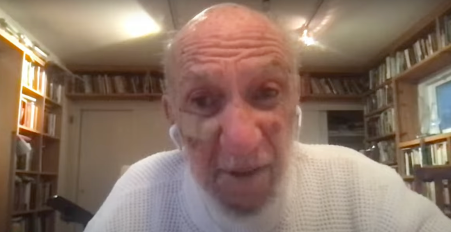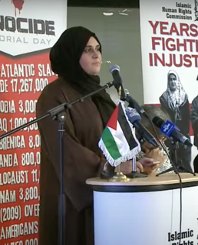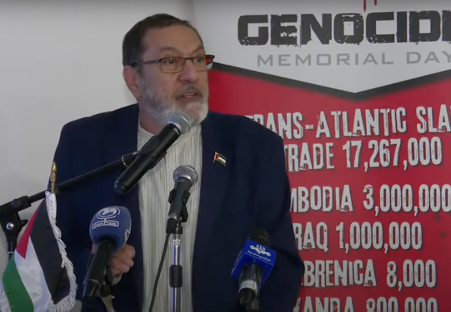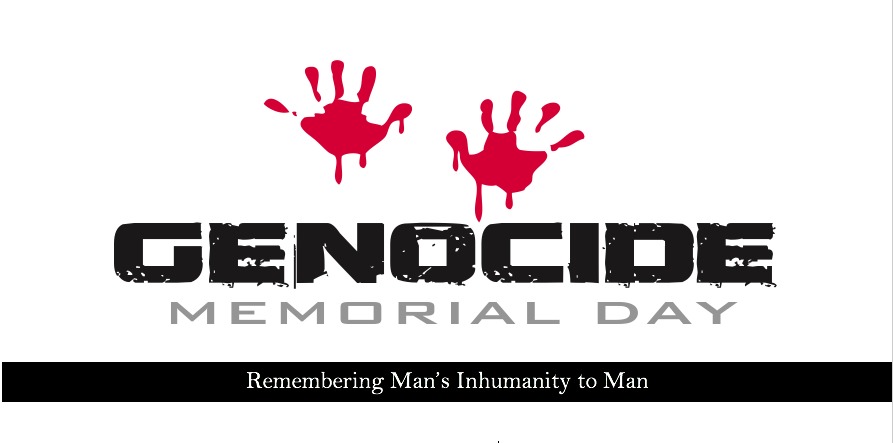On Sunday, January 21st, 2024, the Islamic Human Rights Commission hosted its annual Genocide Memorial Day at the P21 Gallery in London. Genocide Memorial Day (GMD) is a day given to remember man’s inhumanity to man in the perpetration of genocides and genocidal acts. IHRC has been holding GMD commemorations since 2010 and has attracted a variety of speakers, diverse audiences, and activists of all political, religious and ethnic backgrounds in highlighting the genocidal acts that are given insufficient exposure by the mainstream media.
This year’s GMD focuses on the theme Gaza: A Case Study of Genocide, and confirmed speakers included Prof Richard Falk, Prof Ilan Pappe, Prof Haim Bresheeth, Rabbi Ahron Cohen, Sara Russell, and Mizan The Poet.
First Session
The event began with a recitation of the Holy Quran verses from Surat An-Nisa by Syed Wajahat Ali and an English translation read by Fatima Merchant.
“Indeed, Allah commands you to return trusts to their rightful owners, and when you judge between people, judge with fairness. What a noble commandment from Allah to you! Surely Allah is All-Hearing, All-Seeing. O believers! Obey Allah and obey the Messenger and those in authority among you. Should you disagree on anything, then refer it to Allah and His Messenger if you truly believe in Allah and the Last Day. This is the best and fairest resolution. Have you, Oh Prophet, not seen those who claim they believe in what has been revealed to you and what was revealed before you? They seek the judgment of false judges, which they were commanded to reject. And Satan only desires to lead them farther away. When it is said to them, “Come to Allah’s revelations and to the Messenger,” you see the hypocrites turn away from you stubbornly. How horrible will it be if a disaster strikes them because of what their hands have done, then they come to you swearing by Allah, “We intended nothing but goodwill and reconciliation.” Only Allah knows what is in their hearts. So, turn away from them, caution them, and give them advice that will shake their very souls. We only sent messengers to be obeyed by Allah’s Will. If only those hypocrites came to you, Oh Prophet, after wronging themselves, seeking Allah’s forgiveness and the Messenger praying for their forgiveness, they would have certainly found Allah ever Accepting of Repentance, Most Merciful. But no! By your Lord, they will never be true believers until they accept you Oh Prophet as the judge in their disputes and find no resistance within themselves against your decision and submit wholeheartedly. And what is it with you? You do not fight in the cause of Allah and for oppressed men, women, and children who cry out, “Our Lord! Deliver us from this land of oppressors! Appoint for us a saviour; appoint for us a helper—all by Your grace.”
After the Quran recitation, IHRC’s Raza Kazim opened up the event by welcoming the guests and speakers and then introduced Genocide Memorial Day by explaining the project’s history and concept. He explained that the idea of GMD was to hold people accountable regardless of the people who were doing the oppression and regardless of the faith or ethnicity of those oppressed. Raza was clear about the notion of the hierarchy of victimhood regarding memorialising genocides, and therefore, the GMD aims to address this imbalance, but also, the aim of GMD seeks to challenge the very conditions that enable genocides to take place. After his introductory speech, he invited the speakers of the first panel, Sara Russell and Mizan, onto the stage.
Sara Russell is a freelance documentary street, landscape and portrait photographer. Inspired by storytelling, over the last 1ten0 years, she has travelled to regions of the Islamic World such as Iran, Iraq, Morocco and Palestine. Through the lens, Sara intends to capture the existence of beauty, focusing on the light of faith in places where the darkness of hostility and fears manifest from receiving extreme violations and infringement on land and the living. Her intention is to enliven the spirit of faith through a contemplative approach. She intends to provoke reflection in combat to limit beliefs with an attempt to enliven a spiritual liberation movement in pursuit of true freedom. A photographic exhibition was curated to showcase a series, ‘Another Day,’ Palestine 2014 – upon her return from an official delegation she had the privilege to document. Sara also curated a photographic exhibition, ‘Notion of Freedom,’ showcasing a collection of photos by Palestinian award-winning photojournalist and cameraman Haitham Khatib, who is an olive farmer based in a village near Ramallah West Bank. She is currently working on an upcoming fundraising exhibition for Palestine, which is planned for February 2024.
Sara started her talk by emphasising the importance of giving a platform to those who are voiceless. She then explained how important it was to visit Palestine to get a sense and feeling of the place and the importance that arts and culture play in resisting occupation and apartheid. She stated the danger of resisting occupation and apartheid when she said, “Anyone who peacefully resists risks being terrorised and their sacrifice to document the ongoing endless crimes, the huge scale of destruction, the ethnic cleansing in real-time, the struggle to survive is not in vain.” According to Sara, this becomes a duty on all of us thanks to the ongoing narrative war and then went on to explain the importance of art and photography in documenting the ongoing peaceful resistance that is happening in Palestine. She then used Palestinian art and poetry to explain the importance of resistance as well using the imagination to imagine alternative realities while resisting oppression.
After her talk, Raza reflected on her talk and then introduced Rabbi Ahron Cohen, who joined us online.
Rabbi Cohen was born and bred in England, as was his father before him. His mother was born in Poland and came here as a child. His grandparents came to this country from Eastern Europe approximately 130 years ago. He is a family man, and being part of the Orthodox Jewish community, he and his family endeavour to live their lives entirely in accordance with the Jewish Religion. He was trained as a Rabbi but was active in commerce for many years. In more recent years, he became more involved in ecclesiastical duties within the Jewish Community and was particularly involved in educating the youth. More recently, he can be described as semi-retired, although he does not find that he has a lot of spare time. He now spends a lot of his time spreading the important but little-known message regarding the absolute opposition to Zionism held by authentic Orthodox Jewry and the fact that Judaism and Zionism are totally differing concepts and are, in fact, diametrically opposed. Rabbi Cohen is one of many Orthodox Jews who sympathise entirely with the cause of the Palestinians in their struggle against the Zionist State. The spearhead group involved actively in this matter regularly are called Neturei Karta, meaning Guardians of the City, but which can be loosely translated as Guardians of the Faith.
Rabbi Cohen’s talk was about the orthodox Jewish point of view regarding genocides and Genocide Memorial Day, it was especially topical due to what Israel is doing in Gaza. The Rabbi started his speech by stating the legal definition of genocide and the ICJ case of genocide by South Africa. According to the Rabbi, “The very formation of the group which has the intent of causing the destruction, eventually, of another group, by its very nature, this is genocide.” According to Rabbi Cohen, he stated that “we have such a group” that wants to commit genocide and that group is Zionism. He then briefly explained the history of Zionism and its early relationship with the Jewish community. He then explained how Zionism and Judaism differ on religious and political grounds.
The next speaker was Mizan, who recited two spoken word poems. He is a spoken word artist and activist who uses poetry to create awareness about social & political issues. The first poem was called “The Time for Talking is Over”, which was a refutation of a comment made by Margaret Hodge on TV in her debate with Owen Jones. The second poem was called “From the River to the Sea”, which paints a picture of what that phrase, and the notion of a one state for Palestinians and Israelis, means to him.
Poems by Mizan the Poet:
The time for talking is over
She said, live on TV, that if only these two communities can talk…
Talk….
As if somehow, Israelis & Palestinians not talking is the cause of the problem
Tell me how much power do words actually have
Because if talking was the solution then there’d be no military occupation,
There’d be no apartheid or settler-colonialism
There’d be no blockade or refugee’s
Because they’d be free
Living safe and in control of their own fate
But let’s just be honest here
It’s your Zionism that blinds you from seeing
The oppression that the Palestinians face
On a regular basis
In their own ancestral homeland where their own indigeneity has been erased
By a complex form of systemic racism
Which has been fully imposed from the outside
For people like dame margaret hodge
The problem isn’t Israel’s violent system of settler colonialism and apartheid
Nah
The problem is a lack of communication
The problem is an unwillingness to understand why the Palestinians can’t stay here
Because if there was such an understanding
It would be easier to impose Israel’ ‘s cruel system of Palestinian erasure
This is pure anti-Palestinian racism
The utmost worst of it being felt by those imprisoned in Gaza
But it comes in subtle forms too
Such as the willingness to, rightfully, learn about the holocaust
But not about the Nakba
Or if the word terrorist comes to mind when you think of a Palestinian fighter
But not when it comes to an Israeli occupation soldier
Or an armed Israeli settler
Or if you think it’s acceptable for TV personalities to use Islamophobic references
Think Piers Morgan or Julia Hartley Brewer
Nah
We have to fight this dehumanisation
We have to fight this dehumanisation
I have to fight this dehumanisation
Because I want the Palestinians,
I want the Israelis
In fact, I want everyone
To see peace, justice and hope shine like the sunrise
So someone tells Dame Margaret Hodge
The time for talking is over
Ours will be the generation
That dismantles all forms of settler colonialism and apartheid
From the river to the sea
From the river to the sea
children will be smiling
From the river to the sea
freedom will reign supreme
From the river to the sea
people will live to fulfil their dreams
From the river to the sea
in the sky birds will fly singing happy songs
From the river to the sea
laughter will replace the sound of bombs
From the river to the sea
Indigenous communities will thrive on the land where they belong
From the river to the sea
There will be no armed vigilante groups roaming the streets
From the river to the sea
People will be free to express their political beliefs
Without fear of loosing their jobs or being arrested by police
From the river to the sea
The sun will shine beautifully in the holy lands
From the river to the sea
Will see the end of military occupation and apartheid
From the river to the sea
Will nurture beautiful, creative, happy souls
From the river to the sea
We’ll see beautiful variations of love unfold
From the river to the sea
Won’t be a place where injustice continues to persist
From the river to the sea
Will provide a blueprint for different communities to co-exist
And even though from the river to the sea
Will show us the true representation of the Abrahamic faiths
From the river to the sea
Will be a place where everyone, all believers and none, will feel safe
The phrase From the river to the sea, Palestine will be free
Is not a call for the ethnic cleansing or the genocide of anyone
It is a call for justice, liberation and the freedom of everyone
Second Session
The second session consisted of speeches by Prof Ilan Pappe and Prof Richard Falk.
Professor Ilan Pappé is an expatriate Israeli historian and socialist activist. He is a professor with the College of Social Sciences and International Studies at the University of Exeter in the United Kingdom, director of the university’s European Centre for Palestine Studies, and co-director of the Exeter Centre for Ethno-Political Studies. Even though his talk ‘Settler Colonialism leads to genocide’ was centred on the issue of Israel-Palestine, it covered themes based on the history of colonialism, the implementation of international law, the logic of the elimination of the natives, the dehumanisation of the natives, racism, and the exceptionalism of settler-colonial state.
Prof Pappe started his talk by highlighting the importance of Genocide Memorial Day and thanked the organisers for inviting him. He then went on to the concept of “Zionism as Settler-Colonialism” as described by Palestinian scholars and went into the historical discourse of Zionism as settler colonialism and described the similarities and differences between Zionist settler colonialism and other forms of colonialism. According to Prof Ilan Pappe, this framing gives us a better understanding of the Israel-Palestine issue because that framing helps you understand why the conflict started and where it is headed. Prof Pappe said, “The most important aspect of a settler colonial movement is its eliminatory policies. Its idea is that in order to create a successful settler-colonial community outside of Europe, you have to eliminate the native”. Settler Colonial movements, in some ways, made sense in the 16th, 17th or 18th centuries because they went hand in hand with imperialism however, Prof Pappe went on to explain that what was unique about Zionist settler-colonialism was that it appeared during the era of international decolonisation. He said that historically, Israel sold its ethnic cleansing with this idea that it wanted to be seen as a democratic state, but this is a new phase of the conflict. He ended by saying that even though we are witnessing an ethnic cleansing in Gaza, he said that all settler-colonial projects end with an immense sense of violence and cruelty. Therefore, we are seeing the end of the Zionist settler-colonial project.
Third Session
Raza Kazim introduced Professor Haim Bresheeth-Žabner, a filmmaker, photographer and a Professorial Research Associate at SOAS University of London. His books include the best-selling Introduction to the Holocaust, The Gulf War and the New World Order, and The Conflict and Contemporary Visual Culture in Palestine & Israel, a special issue of Third Text. His films include the widely shown State of Danger (1989, BBC2), London is Burning (2013) and Convivencia at the Turnpike (2015. His book An Army Like No Other: How the IDF Made Israel, published by Verso, 2020.
Prof Haim Bresheeth-Zabner started off his talk by thanking the organisers and wanted to connect the narratives held before his talk. Prof Bresheeth-Zabner wanted his talk to highlight what Judaism is, what it needs to be and how Israel is not a Jewish state. He stated how he grew up in a religiously Jewish family, but even with his upbringing, he cannot identify with Israel, questioning what Jewish about Apartheid is, racism, settler colonialism and genocide. He connected the relationship between historic Islamophobia and how Islamophobia is connected to antisemitism, and it was in Muslim countries that Jews felt safe. However, regarding Israel as a state, Prof Bresheeth-Zabner explained how Israel is separate from Judaism and the importance for Jews to come out in solidarity with the Palestinians.
The next speaker was Professor Richard Falk, who joined the event online. He is Albert G. Milbank, Prof Emeritus of International Law at Princeton University (1961-2001) and Chair of Global Law, Faculty of Law, Queen Mary University London. Since 2002 has been a Research Fellow at the Orfalea Center of Global and International Studies at the University of California, Santa Barbara. Between 2008 and 2014, he served as UN Special Rapporteur on Israeli Violations of Human Rights in Occupied Palestine. Falk has advocated and written widely about ‘nations’ that are captive within existing states, including Palestine, Western Sahara, Catalonia, and Dombas. He is Senior Vice President of the Nuclear Age Peace Foundation, having served seven years as Chair of its Board. He is Chair of the Board of Trustees of Euro-Med Human Rights Monitor. He is co-director of the Centre of Climate Crime and Climate Justice, QMUL. He has been nominated for the Nobel Peace Prize several times since 2008, and in 2021, Foreign Affairs selected his This Endangered Planet (1972) as one of the six most influential books on global issues published in the last 100 years.
His recent books include (Re)Imagining Humane Global Governance (2014), Power Shift: The New Global Order (2016), Palestine Horizon: Toward a Just Peace (2017), Revisiting the Vietnam War (ed. Stefan Andersson, 2017), On Nuclear Weapons: Denuclearization, Demilitarization and Disarmament (ed. Stefan Andersson & Curt Dahlgren, 2019. And with John Dugard & Michael Lynk, Protecting Human Rights in Occupied Palestine: Working Through the United Nations (2023). He has published a book of poems, Waiting for Rainbows, in 2015 and a personal/political memoir, Public Intellectual: The Life of a Citizen Pilgrim, in 2021.

Prof Falk thanked the organisers for arranging the meeting and inviting him to speak. He stated that there are features that distinguish this genocide from other genocides, namely the transparent, open nature of this genocide, which was never previously confronted in other genocides. According to Prof Falk, this is a delegitimising moment for the global West, namely the Western settler-colonial states. According to the professor, the response from the Western nation-states was another factor that separated this genocide from others. The professor then gave his thoughts on South Africa’s case against Israel in the ICJ and how the world’s media has responded to the case, which is one-sided.
IHRC’s Raza Kazim then opened up the floor for Q&A, which covered all topics related to the issue of genocide in Gaza.

IHRC Chair Massoud Shadjareh closed the event with some final remarks highlighting the importance of the Genocide Memorial Day project and event and the work done by IHRC. To watch the event, click here.








